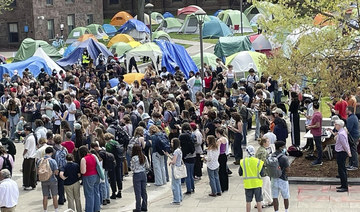CHICAGO: Students protesting against Israel’s war on Gaza are being treated more harshly and unfairly by authorities at Arizona State University than pro-Israel activists, including a professor accused of harassing a Muslim woman who was not involved in the protests, according to a lawyer in Michigan.
Authorities arrested and suspended 27 pro-Palestinian protesters at the university on April 26 for “creating a disturbance.” The suspensions could prevent them from graduating. Attorney David Chami, who is representing 22 of the students, described the response as “disproportionate and unfair,” and said the intention was to “quell free speech.”
The lawyer told Arab News that ASU officials were treating pro-Palestinian protesters “far more unfairly” than pro-Israel activists, including an ASU postdoctoral research scholar, Jonathan Yudelman, who is now on leave pending an investigation into allegations that he aggressively harassed a 20-year-old female Muslim student who was wearing a hijab but not involved in the campus protests.
Chami graduated from ASU Law in 2009 and said that during his time there he worked in the university’s Student Legal Services Department defending student rights.
“I can tell you without a doubt, there have been students (involved in past incidents) who caused property damage, vandalized dorm rooms, gotten DUIs, … breaking the law, violating the student code of conduct, doing things that are not free speech, constitutionally protected activities, and they don’t get suspended from school,” he said.
“Some of them have been kicked out of dorm rooms but they don’t have their access to complete their course work disrupted. I think the evidence will establish that ASU’s actions were disproportionate and intended to quell free speech. This has nothing to do with any alleged violations of the Student Code of Conduct. This is about shutting down protests and future protests.”
Authorities at ASU argued that the action taken by students “was more than a protest,” and said it violated university policies that prohibit erecting tents.
Chami described this as “ridiculous” and “a double standard,” comparing the way in which the university had responded to “non-violent” protests by students with its response to a faculty member, Yudelman, who he said had engaged in a verbal assault that might be classified as a “hate crime.”
In a video of the incident on May 5, Yudelman can be heard mocking the woman, who tries to walk away and asks him to leave her alone, saying: “You’re disrespecting my religious boundaries.”
Yudelman responds menacingly, saying: “I am literally in your face. That’s right … You disrespect my sense of humanity.” He also uses a derogatory word for a woman. Another man is heard calling the student a “jihadi.”
Chami said another man seen in the video, who also confronts the woman, is believed to be an “outside agitator,” allegedly an Israeli soldier who has harassed students during pro-Palestinian protests.
“I don’t think there is any doubt that what ASU has done is to make an example of these (pro-Palestine) student protesters in order to do exactly what the law doesn’t allow, and that is to chill future protests, to place these students and other students in fear that if they were to come to campus and protest they could face expulsion or suspension, and to discourage them from participating in these types of activities,” Chami said.
"On May 6, ASU President Michael Crow gave one final assignment to graduates, and that was to fight; he literally used the words ‘fight for your freedoms,’ and he identified the freedoms to be — and I will limit it to the two important ones — freedom of speech and freedom of religion. This was one week after he suspended 27 students for free speech and freedom of religion.”
Neither Crow nor Yudelman responded to requests for comments.
The American Arab Anti-Discrimination Committee on Wednesday said that the harsh responses to pro-Palestine demonstrations at dozens of college campuses across the US, including arrests, expulsions and harassment, while similar conduct by pro-Israel protesters is ignored, is a problem.
“ADC is outraged at the continued reckless endangerment of university students by the very administrators responsible for their well-being,” the organization said.
“Early this morning, we witnessed another excessive show of force against student protesters, this time in Washington, D.C. at the George Washington University Gaza solidarity encampment. This follows the military-style invasion of hundreds of NYPD officers into Columbia University.
“Across the country, police officers have physically assaulted students, torn hijabs off Muslim students, violently thrown students down stairs, used mace from point-blank distance, and choked students with their knees as they were handcuffed.”
The ADC denied allegations that pro-Palestinian protests are “antisemitic,” pointing out that many Jewish students and activists have also been “speaking out against Israel’s government actions.” It said it has established a legal defense fund for student protesters assaulted by university officials, police or counterprotesters.


























